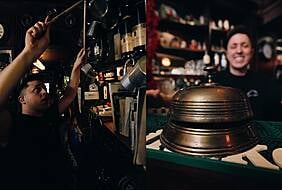Adele Roberts has said receiving treatment for bowel cancer early helped “save my life”, as she supports a campaign to raise awareness about the symptoms of the condition.
The BBC Radio 1 DJ, 44, said in October 2021 that she was undergoing treatment following her stage two diagnosis, and later had surgery to remove a tumour and began using a stoma bag.
After announcing she was cancer-free in June last year, she is now encouraging others to speak to a professional early on if they spot any of the signs.
Roberts said: “It took me a while to pluck up the courage to call my GP at first.
“My symptoms seemed like things I could explain away. I didn’t want to be a burden to the NHS and I was embarrassed.
“I shouldn’t have worried. My GP took my concerns seriously, put me at ease and also offered me a home-testing kit. This meant I was able to do the test in the comfort of my own home.
“Soon after I was diagnosed with stage 2 bowel cancer, which was very nearly developing into stage 3.
“Getting the help I needed in time helped save my life. If you’re worried please speak to someone, early detection saves lives and it helped save mine.”
A new survey by Bowel Cancer UK has found that 38% of people cannot name any symptoms of bowel cancer.
As part of the charity’s new campaign for Bowel Cancer Awareness Month this April, they are flagging a number of the key signs, which include blood in your poo, change of bowel habits, pain or lump in your tummy, weight loss and fatigue.
It's so important to know and share the symptoms of bowel cancer 👇
If you have any symptoms, don’t be embarrassed and don't ignore them. Doctors are used to seeing lots of people with bowel problems.
Read more: https://t.co/tZbleVhnhj pic.twitter.com/36ITG5MHZ2Advertisement— Bowel Cancer UK (@bowelcanceruk) January 8, 2023
Their research also showed that 59% of people said that something would likely prevent them from contacting a doctor if they experienced a change in bowel habit, including difficulties getting an appointment, being too embarrassed or being too afraid that it could be something serious.
Professor Peter Johnson, national clinical director for cancer at NHS England, said: “As with all cancers, acting at the first sign of symptoms can make a big difference to how bowel cancer can be treated and how successfully.
“You are much more likely to survive a cancer that is diagnosed early, which is why the NHS and charities like Bowel Cancer UK have run awareness campaigns about the signs to look for.
“Referrals for bowel cancer tests have been at record levels for the last 18 months, and we would encourage people to speak to a GP about any concerning symptoms: knowing what is normal for you and acting when something isn’t right can make all the difference.”
Genevieve Edwards, chief executive of Bowel Cancer UK, added: “It’s concerning that people aren’t aware of the symptoms of the UK’s second biggest cancer killer.
“Someone dies from the disease every 30 minutes in the UK, which means that in the time it takes to watch an episode of your favourite soap, one family will lose a loved one to bowel cancer.
“But it doesn’t have to be this way as it is treatable and curable, especially when diagnosed early.
“That’s why this Bowel Cancer Awareness Month we’re launching a new campaign to raise awareness of the five red flag symptoms of the disease and asking people to take our KnowTheHigh5 quiz.”







